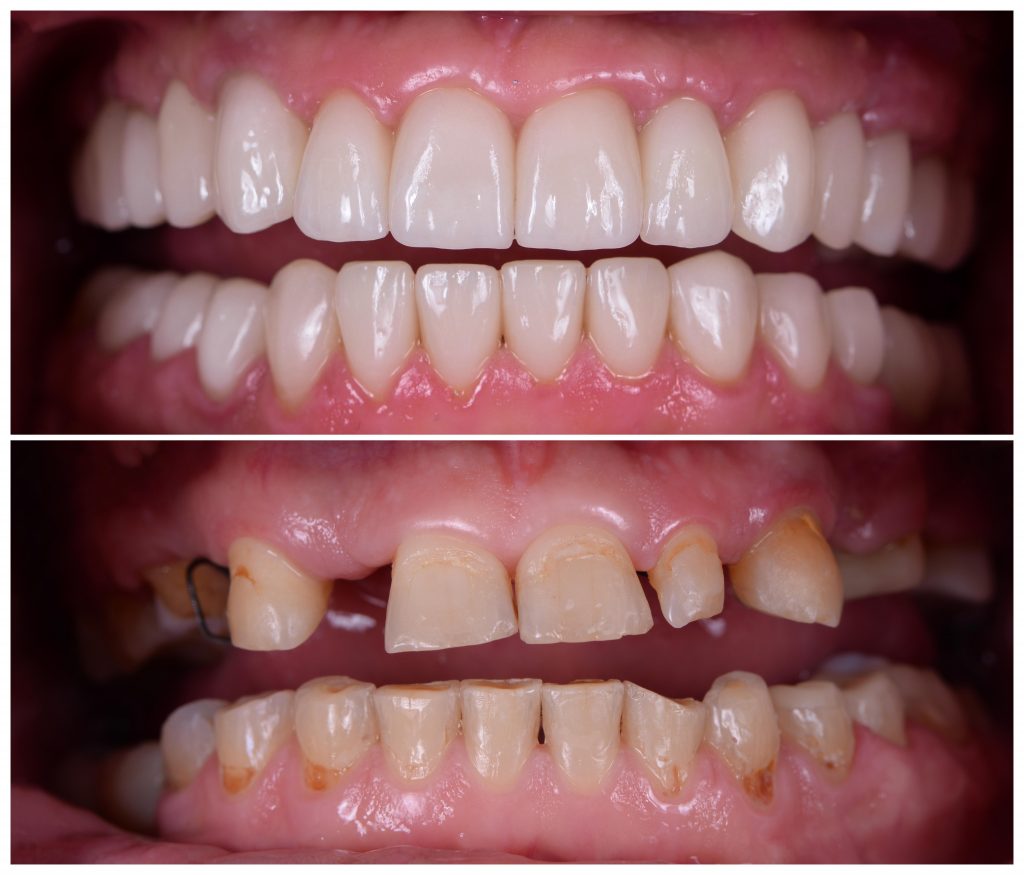Gentle Care Dentistry & Implants
General Dentist & Dental Implant Provider located in Sierra Vista, AZ
General Dentist & Dental Implant Provider located in Sierra Vista, AZ
While dental implants are one of the most popular tooth replacements today, not everyone may qualify for treatment. Ideal candidates for dental implants are in optimal oral health, with no indications of tooth decay or periodontal disease present in the mouth or remaining teeth. Additionally, they don’t suffer from bone loss and have enough jawbone density to secure the implant firmly.
To learn more about your candidacy for dental implants, contact our Sierra Vista, AZ, dentist today by scheduling an appointment at (520) 458-9460.
Dental implants are artificial tooth roots made of titanium that are surgically placed in the jawbone to replace missing teeth. These implants are designed to mimic the natural tooth root, providing a stable foundation for replacement teeth. Unlike other tooth replacement options, dental implants integrate with the jawbone, offering a durable and long-lasting solution. This integration not only ensures stability but also helps maintain the jawbone’s health, preventing the bone loss that often accompanies missing teeth. For individuals seeking a reliable and natural-looking solution to replace missing teeth, dental implants are an excellent choice.

Dental implants require a certain amount of healthy bone to support the implant post securely. If you’ve been missing teeth for a long period of time, you may have experienced bone loss in the jaw. To determine if your bone is adequate for implants, Dr. Hales may use X-rays or CT scans to assess your jawbone’s structure and density. If necessary, supplemental procedures like bone grafting can be performed to build up the bone before implant placement.
Healthy gums are essential for the success of dental implants. The gum tissue must be free from periodontal disease or infections that could compromise the implant’s ability to integrate with the bone. Dr. Hales will evaluate your gum health during your consultation and, if needed, recommend treatments to address any gum disease before proceeding with the implant procedure.
Your overall health plays a critical role in your candidacy for dental implants. Certain medical conditions, such as uncontrolled diabetes, heart disease, or autoimmune disorders, can affect the healing process and increase the risk of complications. Dr. Hales will review your medical history and discuss any health concerns that may impact your ability to undergo implant surgery.
Proper oral hygiene is crucial for the long-term success of dental implants. Patients who maintain good oral hygiene are more likely to experience positive outcomes with their implants. Dr. Hales may evaluate your current brushing and flossing habits and offer recommendations to improve your oral care routine before and after implant placement.
While there is no strict age limit for dental implants, age can influence candidacy. Younger patients whose jawbones are still developing may not be ideal candidates until their jawbones have fully matured, typically around the age of 18 for women and 21 for men. Older patients, provided they have good overall health and bone density, can typically be successful candidates for implants as well.
Dental implants represent a significant investment, and the dental implants cost can vary based on individual needs and circumstances, including the complexity of the procedure, the materials used, and any supplemental treatments that may be required. We suggest consulting your insurance providers for coverage options. At Gentle Care Dentistry, we offer a range of financing options to make dental implants more affordable. It’s important to discuss your financial situation with Dr. Hales so you can make an informed decision about your treatment plan.
Some medications, particularly bisphosphonates used to treat osteoporosis, can interfere with the healing process and affect bone regeneration. If you’re taking any medications, be sure to inform Dr. Hales, who will review your medication history to determine if adjustments are needed prior to moving forward with dental implants.
It’s important to have realistic expectations about the results of dental implants. While dental implants offer a high success rate and are known for their durability and natural appearance, they may not be suitable for every patient or every situation. Dr. Hales will thoroughly discuss the potential outcomes with you, so you have a clear understanding of the benefits and limitations of the procedure.
Successful dental implants require ongoing care and attention. Dental implant procedures often result in common side effects such as swelling, discomfort, and minor bleeding, which need to be managed carefully. Following the procedure, patients must commit to attending follow-up appointments and maintaining oral hygiene to ensure the implants remain healthy and functional. Dr. Hales will provide post-operative instructions, and it’s important to follow them diligently for optimal results.
Smoking can significantly increase the risk of implant failure due to impaired blood circulation and reduced healing ability. Dr. Hales may recommend that smokers quit or significantly reduce smoking before undergoing dental implant surgery. Similarly, excessive alcohol consumption can impair healing, so it is important to follow Dr. Hales’ recommendations to maximize the success of the procedure.
One of the most appealing benefits of dental implants is the beautiful results they offer. The replacement teeth attached to the implants are custom-made to match the color, shape, and size of your natural teeth. This customization ensures that the implants blend seamlessly with your existing teeth, providing a natural and aesthetically pleasing appearance. With dental implants, you can regain your confidence and enjoy a smile that looks and feels completely natural.
Dental implants are renowned for their longevity. With proper care and maintenance, they can last for many years, often a lifetime. Unlike dentures or bridges, which may require frequent adjustments or replacements, dental implants offer a more permanent solution. This long-term reliability makes dental implants a cost-effective option in the long run, as they do not necessitate the ongoing expenses associated with other tooth replacement methods.
A significant advantage of dental implants is their ability to prevent bone loss. When teeth are missing, the jawbone can begin to deteriorate due to lack of stimulation. Dental implants mimic the function of natural tooth roots, stimulating the jawbone and preventing this deterioration. By maintaining the jawbone’s health, dental implants help preserve the natural shape of your face, ensuring a more youthful appearance. This prevention of bone loss is crucial for maintaining both oral health and facial aesthetics over time.

The implant placement procedure is a crucial part of the dental implant process, significant for individuals with various dental issues. It ensures patient comfort through the use of local anesthetic. In some cases, dental implants may require additional procedures to ensure the jawbone can properly support the implants. These procedures may include:
If you are not a candidate for dental implants, there are still excellent alternatives to restore a missing tooth. Options such as traditional dentures and dental bridges may be better suited for your needs. Dr. Hales can help you explore these alternatives and find the most appropriate solution for your smile.
For patients who prefer non-invasive treatments, dentures offer a quick and affordable option, while dental bridges can replace one or a few missing teeth without requiring implants. Each option has its advantages and can help restore the functionality and aesthetics of a missing tooth.
No, dental implants require healthy gums and jawbone to be successful. If you have active gum disease, it must be treated and resolved before you can proceed with dental implant placement.
Smoking can increase the risk of complications and implant failure due to impaired blood flow and healing. While smokers can still receive implants, they may be advised to quit smoking before and after the procedure to improve healing and success rates.
Patients with uncontrolled systemic diseases, such as diabetes or Parkinson’s disease, may be at higher risk for complications. Additionally, individuals with osteoporosis or those on medications like bisphosphonates may not be ideal candidates for implants. Dr. Hales will evaluate your health history to determine if dental implants are right for you.
Recovery time varies depending on the individual, but most patients can expect some swelling and discomfort for a few days after the procedure. Full integration of the implant with the jawbone, a process known as osseointegration, can take a few months. Dr. Hales will provide detailed post-operative care instructions to ensure a smooth recovery.
Do you think dental implants are the best treatment for you? Implant dentistry requires specialized skills from oral and maxillofacial surgeons to ensure successful dental implant placement. Contact our Sierra Vista, AZ, dentist today at (520) 458-9460 to schedule your appointment at Gentle Care Dentistry and Implants. Dr. Hales and his team will guide you through the treatment steps and see if you qualify for dental implants.
